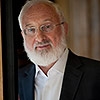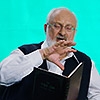Audio Version Of The Blog – 3/24/24
Listen to an Audio Version of the Blog
Download:MP3Audio

Listen to an Audio Version of the Blog
Download:MP3Audio
 Question: What state is desirable for Israel to reach in its relations with neighbors?
Question: What state is desirable for Israel to reach in its relations with neighbors?
Answer: The neighbors must understand that they can coexist with us only in friendship and love. I use such lofty words although they do not quite stick to our neighbors, but still, this is what we need to achieve.
Question: Should there be fear among them that if they suddenly cross the borders they will be punished?
Answer: Yes there should be. But I believe that ultimately, we should reach a state where war is completely impossible. It would be nice to see this in perspective.
[326394]
From KabTV’s “News with Dr. Michael Laitman” 2/12/24
Related Material:
Make Hatred Turn into Love
What Did the Prophets Predict?
The Truth About The Three Religions, Part 1
 A dialogue between Greed and Generosity:
A dialogue between Greed and Generosity:
– Greed, oh Greed, give me a bigger pot.
– No, I do not have enough for myself.
– Give me a smaller pot then.
– I will not give you a smaller one either.
– Then give me the smallest one.
– I will not give you anything at all.
– Suit yourself. Here is a pie for you then.
– Alright. But why just one? You are Generosity, after all.
– Well, I wanted to give you more, but you did not give me any pots.
Question: Can we say that there are plenty of “pies” for us, they are there, but we, humans, do not provide “pots” for them?
Answer: Yes.
Question: What do you mean by “pots” and “pies”?
Answer: “Pot” is a vessel (Kli) into which one can receive something from the Creator. And “pies” are what He gives. But, essentially, we do not need it. We should be content with what we receive.
Question: Even here, do you believe that one “pie” is enough for us?
Answer: Yes.
Question: Do we not need to provide a lot of “pots”?
Answer: Nothing! A “pie” can be before you, you will look at it and be satisfied.
Question: Why is that? Why do I not eat it?
Answer: You do not need to. You just need to know that it comes from the Creator.
Question: And to know that it will always be with me?
Answer: This is already egoism; this is a lack of faith. But generally speaking, yes.
Question: So is true faith above reason that the “pie” is here now and it will not disappear, it will be here tomorrow and today? I can leave it untouched, I can touch it, it will be there all the time?
Answer: Yes.
Question: So do I always have, for example, a couple of coins in my pocket to buy a pie?
Answer: I do not even need those couple of coins. It is unnecessary. I do not need the pies either or anything else. On the contrary, when you feel that you have nothing, then you have a stronger connection with the Creator. And that is it.
Comment: But feeling that I have nothing bothers me.
My Response: No, it does not. On the contrary, you can build your absolute desire, faith in the Creator, and the belief that when necessary, He will give.
[325813]
From KabTV’s “News with Dr. Michael Laitman” 1/15/24
Related Material:
We Can Order the Weather Ourselves
Put Yourself Into Creator’s Hands
Toss a Coin or Think?
 Question: It says that spiritual correction occurs at midnight. Why exactly at midnight?
Question: It says that spiritual correction occurs at midnight. Why exactly at midnight?
Answer: Because it is the time of the revelation of the Shechina.
Question: The more you imagine yourself and your friends near the Creator, the more evil thoughts arise like we are no longer worthy to be near the Creator. What does this indicate?
Answer: It means that you must continue. The Creator made us so ugly; therefore, He cares for us to change and ascend.
Question: What does establishing oneself in faith by quantity and quality mean?
Answer: Quantity is determined by how many times you try to approach the Creator during the day. And quality is determined by what you ask from Him, how you wish to join Him. Then, you will have the proper connection with the Creator.
Question: Where is the line between hatred for evil and self-flagellation so as not to turn into a fool who sits and eats his own flesh? What can protect us from falling into this state?
Answer: If I turn to my friends, they will definitely hear me.
[326107]
From the Daily Kabbalah Lesson 1/14/24, Writings of Rabash “The Daily Schedule”
Related Material:
Questions about Spiritual Work—88
Questions about Spiritual Work—87
Questions about Spiritual Work—86
 Question: By the road stood the trunk of a dried-up tree. At night, a thief passed by and got scared; he thought it was a policeman. A young man in love walked by, and his heart joyfully skipped a beat; he mistook the tree for his beloved. A frightened child, influenced by scary stories, saw the tree, and burst into tears. But in all cases, the tree was just a tree. “We see the world as we are.”
Question: By the road stood the trunk of a dried-up tree. At night, a thief passed by and got scared; he thought it was a policeman. A young man in love walked by, and his heart joyfully skipped a beat; he mistook the tree for his beloved. A frightened child, influenced by scary stories, saw the tree, and burst into tears. But in all cases, the tree was just a tree. “We see the world as we are.”
Could you please tell me, what does it say about us if today we see the world in wars, suffering, troubles, and so on?
Answer: We are a reflection of the world. Essentially if we perceive the world as full of suffering, it means that we ourselves are fundamentally like that. And deep inside we don’t actually wish to see the world differently. We, in fact, want it to stay that way. We cannot rise above what we feel. That is the problem.
Question: So do we want this suffering?
Answer: Yes, we are accustomed to it; we dwell in it. And that’s the problem.
Comment: But that’s essentially anti-life.
My Response: That’s where we are.
Question: So we’re not really living?
Answer: We are not living.
Comment: It’s a complete turnaround: that we want suffering.
My Response: Our entire history, the history of all humanity, is just a continuous flow of suffering.
Comment: But we think we were set up for this. And even in the Torah, it is said: “Go and suffer.”
Essentially, it is said that you will suffer. So, we are not responsible, we are not carrying it with us, we were put in this position. And you’re saying it lives within us.
My Response: I believe it is our fault. We don’t wish to rise above this degree. We don’t want to!
Question: So the whole task is to want?
Answer: To want to overturn all of this, to break free from this tangle of suffering.
Question: What does a person need to do for that?
Answer: A person needs to stop hating others, to bring oneself closer to others. And then everything will change.
Question: Does he need to understand that he wants to suffer, wants suffering?
Answer: Yes, I think we just need to forbid ourselves to suffer because by suffering, you provoke suffering in the world. Wake up and sing!
Question: So if you’re in pain, wake up and sing. Like that song: “Wake up and sing, try in life at least once…”?
Answer: Yes.
Question: Now, here’s a question. Later, all of them – the child, the lover, the thief – found out in the end that it was just a tree, what they were afraid of. What do we need to find out? What is in front of us?
Answer: The Creator! Nothing else! And He constantly creates these scenes, visions for us to be afraid and gradually come to an understanding of these mirages.
Question: So, my desire for suffering should turn into what is in front of me…?
Answer: Mirage.
Question: And I don’t have the right to suffer, you say?
Answer: No! As soon as you start to suffer, this mirage turns into materialistic actions, scenes.
Comment: Wars and so on.
My Response: Yes, but if you don’t allow suffering, even if it seems like it is there, then everything is corrected.
Question: And then I slowly start to see the Creator?
Answer: Yes.
Question: When you say “Creator,” what do you mean? What is in front of me, in front of us?
Answer: The force that governs the world, us, and that wants to lead us to the realization of the correct state of nature and ourselves.
Question: What is that state?
Answer: Joy!
[326032]
From KabTV’s “News with Dr. Michael Laitman” 1/1/24
Related Material:
Why Do We Feel Suffering?
What Is The Cause Of Suffering?
To Turn From The Path Of Suffering
 Question: In 414 BCE, the prophet Jeremiah, one of the four greatest prophets and Kabbalists, lived in northern Egypt during the time of the First Temple. During this period, a young Greek philosopher named Aristokl, later called Plato, studied with him.
Question: In 414 BCE, the prophet Jeremiah, one of the four greatest prophets and Kabbalists, lived in northern Egypt during the time of the First Temple. During this period, a young Greek philosopher named Aristokl, later called Plato, studied with him.
Plato recalls: “I was with Jeremiah in Egypt, and initially I was mocking him and his words, and in the end, once I become accustomed to speaking with him and to watch his actions carefully, I saw that his words were words of the living God. Then, I said in my heart, and I established, that he was a sage and prophet.”
The question is: Does this mean that the wisdom of the prophet and Kabbalist was open at that time to other nations?
Answer: Yes, because they were also at an appropriate spiritual level. It means that Plato practically understood who he was dealing with; therefore, this wisdom could be revealed to him.
Question: Why was the wisdom later closed off? Why was Kabbalah closed to the world?
Answer: There are periods in the development of humanity. Initially, it was simple, and there were closer ties between nations without significant differences. But then, alienation between them occurred more and more. Each went their own way, and eventually, there was such a separation that continues to develop to this day.
Question: Where did this prohibition come from? Who prohibited spreading Kabbalah to the nations of the world?
Answer: It was a consequence of the destruction of the Temple, that is, a fall from the level of Temple.
Question: Did the Kabbalists themselves prohibit all of this?
Answer: Yes, of course.
Question: Can we say that the world was not ready to receive this knowledge?
Answer: Yes, naturally, if it had received it at that time, it would not have been able to use it correctly.
Question: How did the wisdom that Plato received from Jeremiah later turn into Greek philosophy with its multitude of gods?
Answer: They took from it what they could, what they could understand, and somehow absorbed it into themselves, into their society, into their system, and that was it. And then…
Comment: But Plato lived by this. He even felt that it was like the words of the living God.
My Response: It does not matter.
Question: Where does it disappear afterward and turn into philosophy?
Answer: It dissolved. Not immediately, but gradually.
Question: But the fact that it was Plato, and everyone talks about him and knows about him, is there still some merit to Jeremiah, his Kabbalist teacher?
Answer: Of course! Everything that Plato later spoke about, he partly received from Jeremiah.
Comment: So, we can say that this high Greek philosophy that everyone talks about is a consequence…
My Response: …of meeting with Kabbalists.
Comment: You are often accused of spreading Kabbalah to the world, to everyone. So, this prohibition still applies to many people today.
My Response: Let those many remain silent.
Question: Can you say what happened? What kind of revolution is this?
Answer: Kabbalah was always spread in waves. There were times when it could be taught, spoken about, and written. And there were times when it was shrinking and concealing itself more and more.
Question: What happened with the time that suddenly started to demand Kabbalah? What kind of time is this?
Answer: It is because we live in an egoistic world and egoism within us constantly develops. Therefore, the Kabbalists, seeing that they had no other method, means, or weapons against the egoism that was developing so much in society, decided to take Kabbalah out of its hidden places and show it to the whole world.
Question: Did your teacher know that you would follow this path of dissemination?
Answer: Of course, he knew. What did he write? And what did his father, Baal HaSulam, write?
Comment: His father even wrote more.
My Response: Yes, so it was natural that those who consider themselves followers of Baal HaSulam and Rabash, and not only them but also Rambam, Ramchal, and Baal Shem Tov, must disseminate Kabbalah.
Question: Does it mean that the time demands Kabbalah?
Answer: Yes.
Question: What problems can Kabbalah solve today?
Answer: It can strengthen people in their quest to find out who we are, what our purpose is, and what we can do to bring the world to peace.
This is necessary for every person. What is the meaning of life? Kabbalah answers all questions. I believe that only its revelation can give people the key to the upper world.
Question: There are many different practices, yet you always highlight Kabbalah. You say, “This is special, this is a wisdom.” You always somehow separate it from all these practices and religions. Why?
Answer: Because, in principle, there are no practices in Kabbalah, only the heart’s desire of a person for a connection with the Creator.
[325912]
From KabTV’s “News with Dr. Michael Laitman” 1/1/24
Related Material:
Kabbalah—The Source of Sciences
How To Recognize A True Kabbalist
The Illuminati’s Coming to Get You… NOT!
 It matters not how strait the gate,
It matters not how strait the gate,
How charged with punishments the scroll,
I am the master of my fate
I am the captain of my soul.
(William Ernst Henley, Invictus)
Question: This poet’s life and destiny were very hard! At the age of 12, he developed tuberculosis of the bone, and his leg had to be amputated, and later, they had to amputate the other one. He was always sick. But at the same time, he was always a fighter. It is said that Robert Louis Stevenson made the pirate Long John Silver in Treasure Island in his image. That is how he was.
Why does this desire to fight fate, to fight the Creator, live in us and lead us through life?
Answer: Yes, there are such special souls, such special people. What can you do? We must try to fight. And we see from historical examples it still gives some results. But it depends on the person and on how he develops.
Question: Is it the character one is born with? Is it already embedded in him?
Answer: Yes.
Question: Why do we so admire such a struggle?
Answer: I would not say I admire it, but I am impressed that there are people born with such set functions and such set qualities.
Question: Are we talking about a struggle with fate and with God?
Answer: Yes, with fate.
Question: But he does not agree with his fate, he fights it. Brumel and Vlasov were like that. After terrible illnesses, they got back on their feet. On their own. This is called “You make yourself.” Is it admirable?
Answer: Yes.
Question: When the Creator tests one’s resolve, what does He want from us? What is this done for?
Answer: All this is added to the piggy bank of the common soul of all mankind, and such people contribute a lot to humanity with their fate.
Question: What do they make humanity understand?
Answer: They bring humanity closer to the Creator.
Question: Despite the fact they are like…
Answer: It does not matter what they feel about it. I am not saying they are some kind of saints. They simply raise the level of man higher toward the Creator.
But I am not in favor of suffering. There are many similar examples where people choose suffering and believe this is how they rise. This is not true.
Question: Then the natural question in this and other cases is how not to suffer?
Answer: If you clearly understand, and you have such conditions when your suffering makes it easier for someone to correct, move forward, then yes. But if it is only in your fantasies…
Question: Now you have raised the bar. You said, “If my suffering makes someone’s life, fate, or soul easier”; you didn’t say “my,” but “someone’s.”
Answer: For others, of course.
Question: That is high! That is, if they are an example for someone, and are doing this for the sake of such an example, to show an example, of what can you try?
That is, if they are an example for someone, and I do this for the sake of such an example, to show an example, what is possible, try?
Answer: Yes.
Question: This is exalted! You keep talking about annulling before fate, before the Creator’s decision. When you say that, what do you mean?
Answer: I mean, I am consciously agreeing with what I see before me.
Question: Even with your illnesses and so on?
Answer: Of course.
Question: Meaning, it comes from You, and it is necessary for me. Like this?
Answer: Yes.
Question: What happens to my pain, to my suffering?
Answer: When we agree with this, it creates peace within us. A person agrees with his fate, with the Creator, he agrees to accept everything coming to him according to his fate.
Question: Is it like an anesthetic?
Answer: Yes.
Question: Is this what you call “annulment”?
Answer: Right.
Question: And must we come to this?
Answer: I believe so, yes.
[324498]
From KabTV’s “News with Dr. Michael Laitman” 12/11/23
Related Material:
Do Not Contradict the Creator
When a Person Needs to Humble Oneself and When Not
“Tree” in the Spiritual Sense
 Question: What does it mean to build a middle line from below that will correspond to the middle line coming from above?
Question: What does it mean to build a middle line from below that will correspond to the middle line coming from above?
Answer: The middle line coming from above is what builds the Kelim. And the middle line coming from below is our Kelim, which we form from our corrected desires.
That is, the upper light prepared by us in the middle line directed from bottom to top will descend into the Kli along the path of the middle line from top to bottom. It is called “One accepts one.”
[326050]
From the Daily Kabbalah Lesson 2/29/24, Writings of Baal HaSulam “Explaining the Discernment of Luck”
Related Material:
The Middle Line Is The Creator’s Patent
The Middle Line Is Above Love And Hatred
Look For The Middle Line
Preparation to the Lesson
1st part of the Lesson — Writings of Baal HaSulam, Shamati #37, “An Article for Purim”
2nd part of the Lesson — “Purim“
Selected Highlights